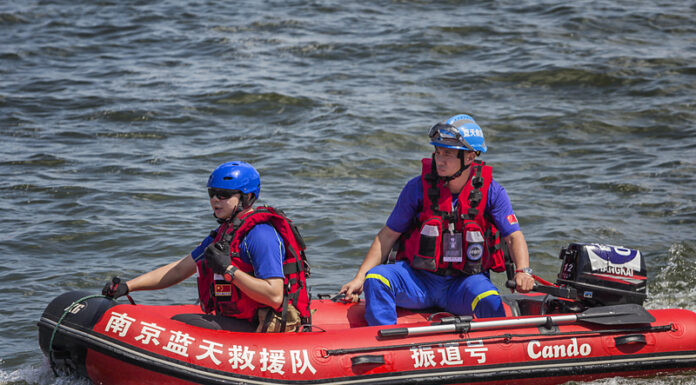Ten people died and 70 others were hospitalized after four tourist boats capsized during a sudden storm on the Wu River in Guizhou province, China, state media reported Monday, May 5.
The incident occurred around 4:40 p.m. on Sunday, May 4, when strong winds carrying rain and hail struck the scenic area in Qianxi city, causing all 84 passengers to be thrown into the water. Initial reports indicated that only two tourist boats had capsized, but authorities later confirmed four vessels were involved in the accident.
Two of the capsized boats were carrying passengers while the other two were tied up at the dock with no tourists aboard. The seven crew members of these docked vessels were able to save themselves, according to state broadcaster CCTV.
State media reported that rescue operations continued overnight with nearly 500 workers, including police, firefighters, and medical personnel, being mobilized to help with the search efforts. By Monday morning, 83 people had been located, with 70 receiving hospital treatment for mostly minor injuries, and four people escaping completely unharmed.
The last missing person was found around noon on Monday but showed no vital signs, bringing the death toll to 10, according to China Central Television.
Chinese President Xi Jinping called for “all-out efforts” to find the missing and provide care for the injured, according to the official Xinhua News Agency. Vice-Premier Zhang Guoqing is reportedly leading the relief efforts at the site.
In one video shared by state media, a rescuer could be seen performing CPR on a victim, while one of the vessels drifted upside down nearby.
CCTV reported that the capsized boats had a maximum capacity of about 40 people each and were not overloaded at the time of the incident. The city’s meteorological bureau had issued a yellow alert for thunderstorms and strong winds prior to the accident, although witnesses reported that the weather had seemed calm and clear just before the storm hit.
An eyewitness told state-owned Beijing News that while the waters were deep, some passengers managed to swim to safety. “However, the storm had come suddenly and a thick mist obscured the surface of the river,” the witness said.
The Wu River is a tributary of the Yangtze, China’s longest river. The mountains and rivers of Guizhou province are major tourism draws, particularly during the five-day May Day holiday that ended Monday. Hotel bookings across the province were reportedly up by a third on the first day of the holiday.
The China Meteorological Administration had warned on Sunday that heavy downpours were expected in southwestern and southern parts of China, including Guizhou and the Guangxi Zhuang Autonomous Region.
President Xi noted a recent series of fatal accidents and underscored the importance of strengthening safety measures at tourist attractions, large public venues and residential communities. He also emphasized the need for increased safety during the rush of travelers returning at the end of major holidays.
This incident follows another serious boating accident in February 2025 in Hunan province, where 11 people were killed after a passenger boat collided with an oil spill cleaning ship and capsized. Additionally, another accident occurred over the weekend in the eastern city of Suzhou, when a sightseeing helicopter crashed in a newly-opened park, killing one person and injuring four others.








